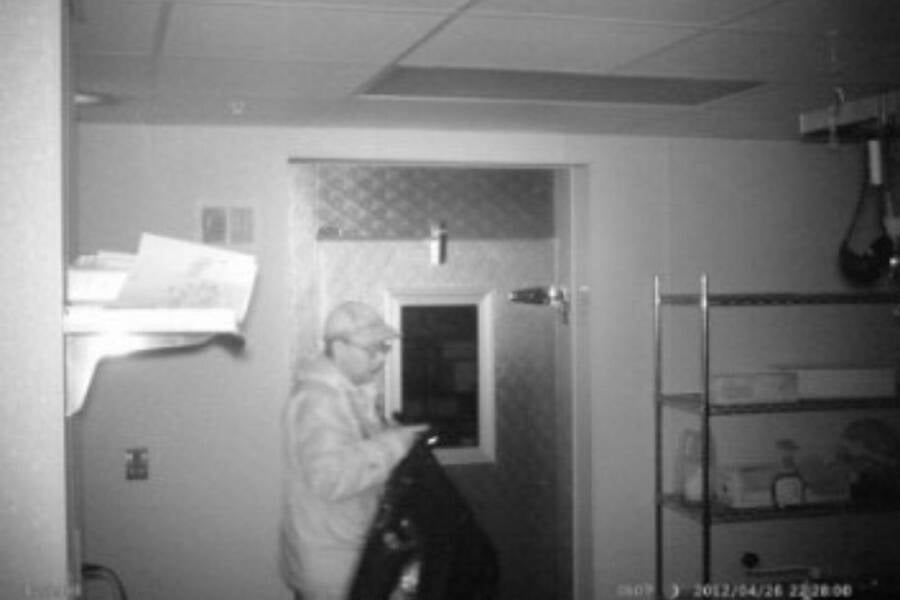Between 1986 and 2013, Christopher Thomas Knight lived alone in the woods of Maine, stealing from seasonal cabins and summer camps in order to survive.

RedditThe “North Pond Hermit,” Christopher Thomas Knight, after his 2013 arrest.
In the 1980s, Christopher Thomas Knight decided to leave the world behind and spend his life in the woods of Maine, unbothered by the demands of bills, a career, or his fellow humans. He was just 20 years old at the time — and he wouldn’t emerge from the forest until he was nearly 50.
Knight survived by stealing from summer camps and seasonal cabins, and while he recognized that his thefts were wrong, he reconciled his moral qualms by entering only uninhabited buildings and taking just what he needed to live: food, clothing, propane tanks, and books to keep his mind occupied.
These mysterious robberies earned Knight a reputation, and locals began referring to him as the “North Pond Hermit.” Then, in 2013, a game warden set out to capture the elusive thief. Knight was arrested that April and spent seven months in jail for his crimes.
While the North Pond Hermit no longer lives in the forests of Maine, he looks back fondly on his decades of solitude. As Knight once told a journalist, “There was no audience, no one to perform for… To put it romantically, I was completely free.”
Christopher Thomas Knight’s Life Before Isolation
“I went to the woods because I wished to live deliberately, to front only the essential facts of life, and see if I could not learn what it had to teach, and not, when I came to die, discover that I had not lived,” wrote Henry David Thoreau in his autobiographical work Walden.
Thoreau, a naturalist and essayist, published Walden in 1854 as a treatise on existing simply in nature. He lived in a small cabin by Walden Pond for two years, two months, and two days, developing a philosophy of self-reliance and simplicity.
Of course, Thoreau was far less isolated than he made it seem. The land he lived on belonged to Ralph Waldo Emerson. His mother brought him meals and did his laundry. He wasn’t exactly “roughing it.” But though Walden initially published to a mild reception, it is now held in high regard. Perhaps that is because, as time has gone on, the idea of leaving the world behind for a quiet life in the woods has grown more and more appealing.
That was certainly the case for Christopher Thomas Knight.
Knight was born in Maine in 1965. Even as a child, he was notably reserved. He liked to spend time alone, if given the option, despite growing up with four older brothers and a younger sister.
He was also skilled with his hands. He developed an early interest in mechanics and electronics and spent much of his free time outdoors fishing or exploring the woods. By the time he graduated from high school, he had established a reputation as a quiet young man who kept to himself.

Knight FamilyChristopher Thomas Knight’s high school yearbook photo from 1984.
After school, Knight briefly attended a vocational program in electronics. In 1986, he was working as an installer for home security systems — a profession that ironically equipped him with the knowledge of how to avoid detection. Despite holding steady work, however, Knight felt increasingly alienated from the demands of modern living.
So, one day, he decided to leave it all behind.
At just 20 years old, Knight quit his job without notice. Not bothering to so much as return his tools or inform his family, he cashed his final paycheck and drove out of town.
“I had no one to tell,” Knight told author Michael Finkel in an interview for the 2017 book The Stranger in the Woods. “I didn’t have any friends. I had no interest in my co-workers.”
It was 1986, the beginning of Knight’s life of solitude — one that would last for nearly three decades.
Becoming The North Pond Hermit
When asked, Knight couldn’t explain his decision. He was not going on a religious or philosophical journey. His parents were “good people,” he said. At first, he didn’t even plan to live in the woods. He had initially grabbed his keys and driven his car down the East Coast, staying in cheap motels until he reached Florida.
Then, after some time, he turned around and headed north again. Eventually, he found his way back to Maine. His family had no clue where he had gone or what had happened to him, but as he drove by his parents’ house, he didn’t stop to say goodbye to them. He just kept driving deep into the woods until he ran out of gas and abandoned his car with the keys inside.
“I can’t explain my actions,” Knight said. “I had no plans when I left, I wasn’t thinking of anything. I just did it.”

Maine State PoliceThe campsite where Christopher Thomas Knight spent 27 years.
He didn’t have much, just some basic camping supplies, extra clothes, and a bit of food to get started. He started heading south into the woods, once again without any real sense of why or where he wanted to end up.
“There was no depth or substance to the idea. It was at the instinctual level,” Knight said. “It’s instinct among animals to return to home territory, and my home ground, where I was born and raised, was that way.”
Eventually, Knight settled in a small clearing near North Pond, about a mile from the nearest vacation cabins. The location was ideal: thick forest cover, boulders for natural concealment, and a slight depression in the ground that hid his shelter from view. He set up a makeshift camp using tarps strung between trees, overlapping to block aerial view and muffle the sound of rain. Moss and leaves covered his gear.
From a short distance, the camp blended seamlessly into the surrounding forest. And though the site was technically on private property, really not all that far from society, nobody came across it due to how difficult the terrain was. This only made Christopher Thomas Knight’s survival more remarkable.
“The locals call it ‘The Jarsey,'” Finkel told National Geographic in an interview about his book.
“It is like a giant Brillo pad; the densest, most disorienting, pathless, boulder-choked forest that is too difficult even for deer to walk through. I’m a decent outdoorsman but when I went to find the site I cut my hands apart and ripped my hiking shoes. Chris Knight was able to walk through these woods, at night, completely silently.”
Knight may have left society behind in a social sense, but he could not ignore his own basic needs, and society is conveniently a place to get basic needs like food, water, and clothing. So, he turned to thievery.
How Christopher Thomas Knight Survived In The Woods For 27 Years
From the start, Knight treated avoiding detection as his most important task. He never lit fires, even in the dead of winter, for fear that smoke would give away his location. In subzero temperatures, he relied on layering stolen sleeping bags and clothing for warmth. On the coldest winter nights, he would wake up at 2:30 a.m. to pace around his campsite so he didn’t freeze to death.
He moved only at night, often during heavy rain or snow, to muffle his footsteps and mask his scent. He wore soft-soled shoes to reduce noise and avoid leaving deep tracks.
To keep himself sane, he adhered to a strict daily routine. Knight would wake before sunrise, check the perimeter of his camp, read for hours, cook simple meals, clean, and then sleep at sunset. He took canned food, propane tanks, batteries, clothing, books, and magazines from vacant vacation homes, summer camps, and storage sheds. Notably, he always avoided valuables like electronics or jewelry, reasoning that cash and goods would attract more police attention.
Over the years, the targeted burglaries gave rise to rumors and the moniker “The North Pond Hermit.” He learned campers’ routines so that he knew when the cabins would be empty. Of course, no one knew the true story, and some people feared, naturally, that Knight could be dangerous — possibly even a killer.

Maine State PoliceA still from the motion-activated camera that captured Knight stealing food.
“He used us as his local Walmart,” Harvey Chesley, facilities manager of the Pine Tree Camp for children and adults with disabilities, told the Bangor Daily News after Knight’s arrest in 2013. “The frustration was that we couldn’t leave anything at the camp because it was open game to him. He hit a lot early in the season.”
There were only a couple of times over the course of 27 years that Knight actually interacted with other humans. Sometime in the early 1990s, Knight and a hiker passed each other by. The hermit gave them a simple nod, said hello, and went on his way. In 2012, he accidentally broke into a cabin where a man was sleeping and fled immediately when the occupant shouted at him.
And just a few months before Knight was captured, a group of fishermen came across his campsite, but they promised not to tell anybody when they learned that Knight wanted to be left alone.
Still, Christopher Thomas Knight couldn’t remain fully undetected forever. People noticed things missing. Burglary reports flooded in, with many victims noting the “unusual neatness” of the crime scene. Knight would, in fact, often clean up a bit and make sure to lock the door behind him. He took no joy in thieving, nor did he want another robber breaking in after him.
“Every time, I was very conscious that I was doing wrong,” he said. “I took no pleasure in it, none at all… My adrenaline was spiking, my heart rate was soaring. My blood pressure was high. I was always scared when stealing. Always. I wanted it over as quickly as possible.”
He wasn’t the only one.
Capture, Legal Proceedings, And Life After Isolation
By the early 2010s, Pine Tree Camp had been repeatedly burglarized. Technology had also come a long way since Knight left the world behind in 1986 — and it would ultimately be his undoing. Staff at the camp set up a motion-activated camera in the kitchen and captured images of a man in the act of stealing food.
Not long after, game warden Sergeant Terry Hughes and other officers installed their own surveillance devices and moved in. On April 4, 2013, Hughes found Knight leaving the camp with a backpack full of supplies and followed him to his campsite.
“I was in shock, to be honest with you,” Hughes said. “It was an overwhelming experience. It’s very difficult to articulate… [Knight] was sitting up on the bucket where he sits all day and he was looking up into the sky. I asked him why he was looking up. He was identifying eagles or he was talking about eagles. He knows how many eagles fly over his campsite every day.”
Knight didn’t resist arrest.

Maine State PoliceChristopher Thomas Knight’s booking photo after his arrest.
Back at the police station, Christopher Thomas Knight confessed freely. He detailed his years in the woods and admitted to at least 1,000 burglaries — roughly 40 per year — even offering information that allowed police to close numerous open cases in the area. He also expressed deep remorse for committing the crimes, and when he was eventually sentenced to seven months in prison — all but a week of which he had already served while awaiting sentencing — the judge noted that anything more would have been cruel.
Of course, hundreds of journalists wanted to ask him questions. What had it been like, spending such a long time alone?
“It’s complicated,” Knight said. “Solitude bestows an increase in something valuable. I can’t dismiss that idea. Solitude increased my perception. But here’s the tricky thing: when I applied my increased perception to myself, I lost my identity. There was no audience, no one to perform for. There was no need to define myself. I became irrelevant.”
Christopher Thomas Knight never returned to the woods. After he served his time, his brother helped him get a job at an auto shop in a small town in Maine. Other than Finkel, few people got the chance to interview him. He never treated his time in solitude as a moral statement, never provided any philosophical truths. When asked if he had gained any deep insights, he replied simply:
“Get enough sleep.”
After reading about how Christopher Thomas Knight survived alone in the woods for 27 years, read the stories of nine other hermits who shunned society and lived in total isolation. Then, read the story of William Pester, the “Hermit of Palm Canyon.”





